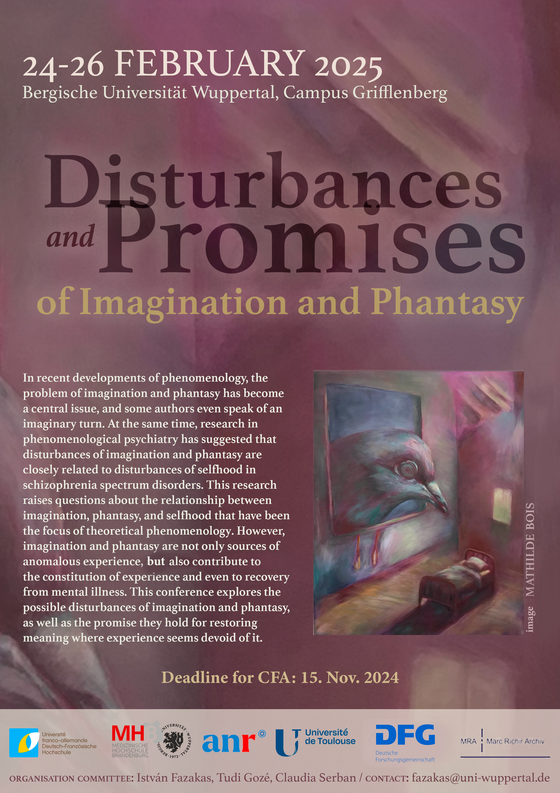Disturbances and Promises of Imagination and Phantasy

Venue: Bergische Universität Wuppertal, Campus Grifflenberg, K Building, Rooms: K. 11.20. (Seminar K5) and K. 11. 10. (Seminar K8), Gaußstraße 51, 42119.
Date: February 24-26, 2025
The conference will be in English
You can find the full program here.
You can find the abstracts here.
For those who want to follow the conference from afar, the talks will be diffused live online on the following links:
Room K8: uni-wuppertal.zoom.us/j/62293910216
Room K5: uni-wuppertal.zoom.us/j/65178410588
Background
Recent investigations in the field of phenomenological clinical psychiatry have put forward the idea that disturbances of imagination and/or of phantasy are closely related to ipseity disturbances in schizophrenia spectrum disorders (SSDs). This research raises questions about the relationship between imagination, phantasy and selfhood that have already been the focus of theoretical phenomenology. However, imagination and phantasy are not only sources of anomalous experience but also contribute to the constitution of experience and even to a possible recovery from mental illness. This conference explores the possible disturbances of imagination and phantasy as well as the promises they hold for relaunching sense, where experience seems devoid of it. If disorders of imagination and phantasy can reach into the depths of the self, it is because imagination and phantasy already operate at the most basic level in every experience.
In the recent developments of phenomenology, the problem of imagination and phantasy has become a central issue. The publication of Husserl’s manuscripts on Phantasy, Image Consciousness, and Remembering (Phantasia, Bildbewusstsein, Erinnerung) has inspired an important number of scholars to reconsider the intertwining between perceptual and imaginative intentionality in the constitution of the real, or even to argue for the primacy of an imaginary or phantastical constitution of reality. But even before this publication and prior to its influence on contemporary research in phenomenology, authors like Eugen Fink, Jean-Paul Sartre or Maurice Merleau-Ponty have devoted major analyses to the phenomena of the imaginary. Indeed, already Fink’s doctoral dissertation (Vergegenwärtigung und Bild. Beiträge zur Phänomenologie der Unwirklichkeit, 1929), Sartre’s early Mémoire de fin d’études (1927) as well as the consecutive works on L’imagination and L’imaginaire, as well as Merleau-Ponty’s developments on the oneirism of wakefulness are all evidence of the phenomenological recognition of the fundamental role of imagination in experience. More recently, Marc Richir has undertaken what he called a refoundation of phenomenology, consisting in a methodic substitution of the register of phantasy to that of perception and resulting in a 500 pages long confrontation with psychopathology in Phantasia, imagination, affectivité (2004). This interest for imagination and phantasy in historical and contemporary phenomenology offers countless conceptual and argumentative resources to address the disturbances and promises of imagination and phantasy.
The central role of imagination in the constitution of experience has also been a topic of the French tradition of psychiatry. While in his seminal work La schizophrénie, Minkowski identifies the underlying condition of schizophrenia as a loss of vital contact with reality, inspired by Bleuler’s work on syntony, Bergson’s vitalism and Janet’s idea of the function of the real (fonction du réel), in his later works he also recognizes – with Bachelard – the importance of a function of the irreal (fonction de l’irréel). How does the function of the irreal, and ultimately imagination and phantasy contribute to the vitality of the contact with reality? Furthermore, imagination and the idea of the function of the irreal are also at the center of Henri Ey’s Traité des hallucinations. Henri Ey develops an original organo-dynamic and architectonical approach where imagination plays a crucial role in the relation of the subject with the world and its disturbances result in what he described as a scandal of perception. The recent developments in the psychopathology of imagination can shed new light on this heritage and vice versa.
Moreover, imagination and phantasy seem to play an important role not only when it comes to describing pathologies but also in theories that inspire descriptions of the development of a sense of self. The works of D. W. Winnicott, for example, on the role of creativity and playing in the early stages of childhood, but also his idea of culture as a prolongation of this archaic transitional space in adulthood offer here a rich material for addressing possible therapeutical strategies. Furthermore, one could also think about the central role that Paul Ricoeur attributes to productive imagination in his theory of narrativity. Narrativity and narrative identity have indeed been at the center of recent phenomenologically oriented studies on psychiatric recovery (Davidson, Koenig) and raise the question of how creative imagination is a condition of the possibility of reinventing one’s own stories.
